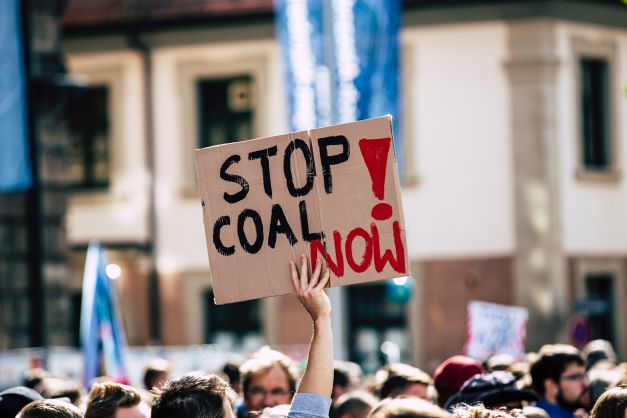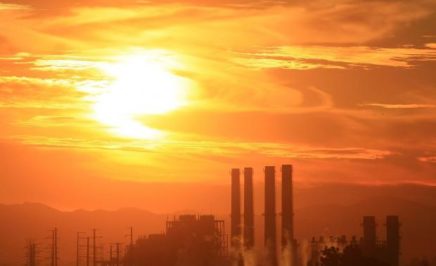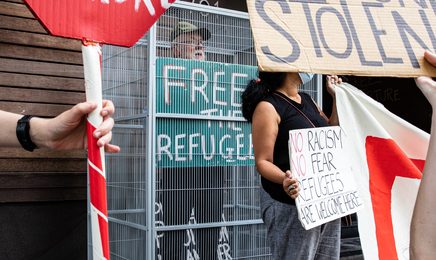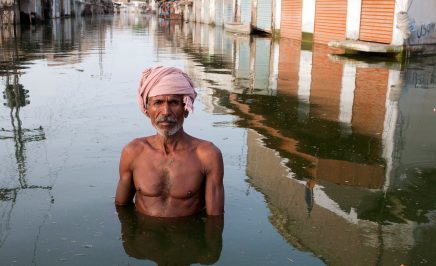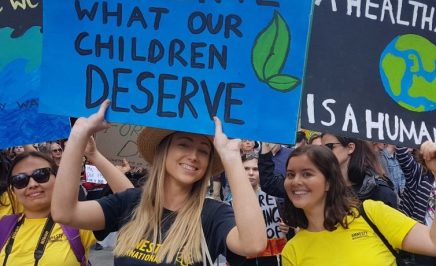The world has already warmed by 1.2 degrees Celsius. The climate crisis is here, and on the frontline are Australia’s northernmost First Nations people in danger of losing their cultural rights, identity and homes to rising seas.
I have known the Guda Maluyligal communities of Saibai and Boigu islands in the Torres Strait for more than 20 years. They are now on the precipice of losing their way of life to inaction on climate change.
Only six months ago I visited Saibai and I was shocked by how much the sea has risen. Their graveyards are in danger of being flooded, and the sea walls they have put up are not big enough. They can no longer grow their vegetables because the soil has been ruined by sea water inundation. They cannot grow vegetables anywhere else, so there is already an extra financial burden on families on those islands – and no fresh vegetables.
The storms are so fierce that the water comes up and over the sea walls – so the defences they anticipated would protect their homes aren’t enough. These islands and the outer islands as well are going to be uninhabitable.
So the leaders of these communities, Uncle Paul and Uncle Pabai, are taking the Australian Government to court in a class action arguing the government has failed to reduce greenhouse gas emissions to a level that will prevent harm to their Torres Strait islands.
They describe the damage inaction on climate change is inflicting on their communities and putting 65,000 years of their culture and traditions at risk as “cultural genocide”.
Amnesty International Australia is supporting this case led by The Grata Fund and law firm Phi Finney McDonald, because it is these First Nations communities’ basic human right to live in their homes on their ancestral lands, and the Australian Government is denying them their rights by its inaction to stop global warming.
Australia has been one of the last developed countries to commit to emissions reductions by 2030. Its 43% emissions commitment falls far short of what’s needed to keep warming below 1.5 degrees Celsius that will prevent devastation in the Pacific. The margin for error is very small and shrinking by the day.
Australia’s emissions are more than triple those of the entire Pacific region, including New Zealand. This shows just how much of a fossil fuel giant Australia is and illuminates the human rights injustice of decades of inaction.
The Intergovernmental Panel on Climate Change (IPCC) makes it clear that it is the most vulnerable populations, including the 476 million Indigenous people around the world, who suffer the most from climate change.
Up on Saibai and Boigu, Uncle Paul and Uncle Pabai are saying the storms are knocking around the seagrass and that’s now impacting the health of the dugong. If you take away vegetables and dugong you are taking away a big percentage of their food.
These are their human and cultural rights at stake, and it’s about their children’s and grandchildren’s right to live on their land, too. Their rights to maintain and strengthen their relationship with the country, waters and coastal seas they traditionally own for future generations are enshrined in the United Nations Declaration on the Rights of Indigenous Peoples (UNDRIP), which it is no surprise Australia has yet to ratify.
If the Saibai and Boigu communities become climate refugees they will lose everything – their homes, culture, stories and identity – and we will all pay the price for this unimaginable loss.
It’s past time to acknowledge that inaction on climate change and unjust delaying tactics amount to human rights violations for First Nations people.
Uncle Paul and Uncle Pabai know this too well and are leading the way in standing up and speaking out. They travelled to Egypt for COP27 to enlighten a global audience and shine a light on what’s happening.
We need the Australian Government to urgently change what they are doing. We can’t keep feeding fossil fuels to the world and delaying the ambitious action needed to prevent climate catastrophe.
We need our politicians to stop failing to respect our own people, the ancient culture, language and traditions. We need them to willingly listen, learn and step up before it’s too late.
Rodney Dillon is Amnesty International Australia’s Indigenous Rights Advisor
Climate change is and will continue to harm all of us unless governments take action. It’s essential that we hold those in power to account and demand action on one of the greatest human rights challenges of our time.
Find out more about our climate justice campaign and join us today to fight for change.
